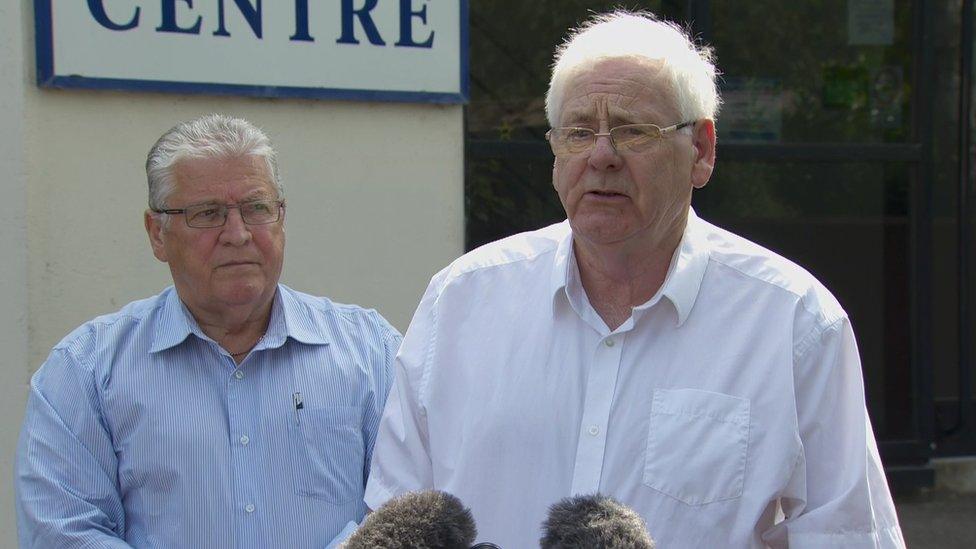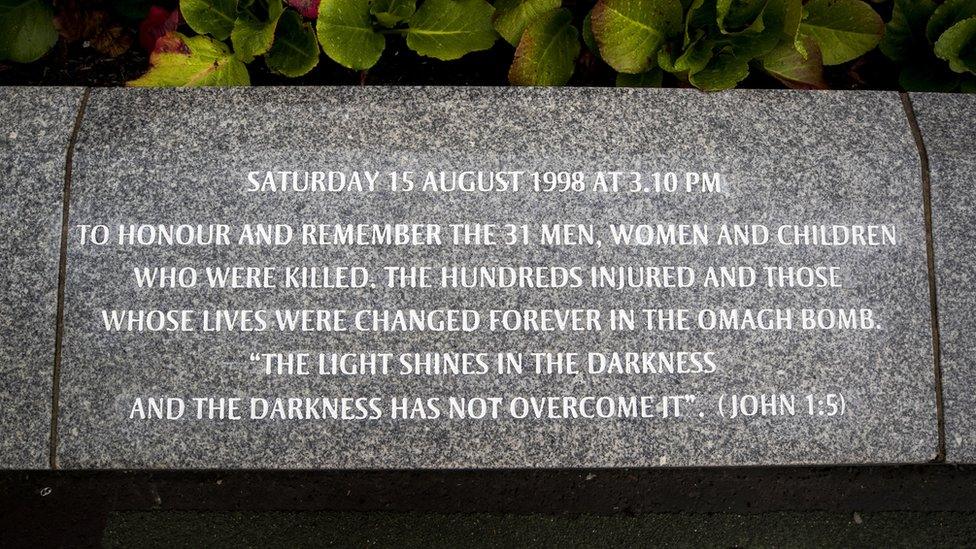Security measures 'may have thwarted Omagh bomb'
- Published

Twenty-nine people, including a woman pregnant with twins, were killed in the Real IRA attack
There is "no doubt" authorities could have made life uncomfortable for dissident republicans in the run up to the Omagh bombing, a judge has said.
He said measures such as roadblocks near their homes could arguably have prevented the 1998 attack.
Mr Justice Mark Horner was explaining his reasons for urging a cross-border investigation.
In response, the Northern Ireland Office said it would "carefully consider" a fresh investigation.
The judge said full sharing of surveillance and mobile phone-tracking evidence may have disrupted the bombers.
The Real IRA attack in 1998 claimed the lives of 29 people, including a woman pregnant with twins., external
It was the biggest single atrocity in the history of the Troubles in Northern Ireland.
'Impaired by political thinking'
On Friday, the High Court in Belfast outlined the reasons for its decision.
It stressed that it had not reached a conclusion there was "a real prospect of preventing the bombing" and said that was for any investigation or inquiry to establish.
It heard in the six-month run-up to the Omagh attack there had been 24 dissident attacks. Many of the suspects would later be involved in Omagh.
Mr Justice Horner said: "There is no doubt the authorities could have made life very uncomfortable for those dissident republicans.
"It is arguable that such a pro-active policy would have had the real prospect of preventing the Omagh bomb."
He identified a potential failure in policy at the time around a de-escalation of security "impaired by political thinking".
He noted that no loss of life occurred in any of the lead-in attacks and that the "exercise of powers" against dissidents "could have provoked a reaction which would have risked the peace process and the possibility of a return to open hostilities with the Provisional IRA".
The Omagh bombing: A timeline of events
The judge went on: "They are not easy decisions for the authorities and the government to make.
"There was much to lose by escalating security prior to Omagh, although it may not appear that way by looking back on what happened in the shadow of the Omagh bomb."
No-one has ever been tried and convicted for the bombing.
The judge said it is "important not to forget" responsibility for Omagh lies with "evil" dissident republicans who showed "complete disregard for human life".
The ruling came in a bereaved father's eight-year legal battle against the government for refusing to hold a public inquiry.
'The beginning of the end'
Michael Gallagher's 21-year-old son, Aiden, was among those who died in the blast.
Proceedings centred on claims that a range of intelligence from British security agents, MI5 and Royal Ulster Constabulary officers could have been drawn together to foil the car bomb plot.

Stanley McComb and Michael Gallagher, who lost loved ones in the bombing, respond to Friday's ruling
In July, Mr Justice Horner called for fresh investigations on both sides of the border, identifying a legal duty under Article 2 of the European Convention on Human Rights (ECHR).
It is not yet clear if the government will appeal the outcome.
Northern Ireland Secretary, Brandon Lewis, said the Omagh families had been through "unimaginable suffering".
Speaking outside the court, Mr Gallagher said: "We are delighted the judge has taken the time and patience to look at all the issues.
"This is the beginning of the end - we hope the government can help us by not dragging us through the courts through an appeal process."
The legal action followed a decision by the government to reject the need for a public inquiry eight years ago.
It said there had been multiple investigations, including those involving the Police Ombudsman.
Related topics
- Published4 March 2021

- Published28 January
